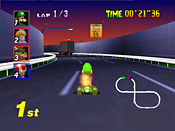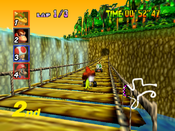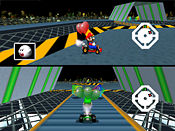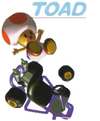Mario Kart 64: Difference between revisions
| Line 227: | Line 227: | ||
*''[[Super Mario Galaxy 2]]'': The [[Boss Blitz Galaxy]] music is similar to Banshee Boardwalk's. | *''[[Super Mario Galaxy 2]]'': The [[Boss Blitz Galaxy]] music is similar to Banshee Boardwalk's. | ||
*''[[Mario Kart 7]]'': Some of the music is derived, but only it's composed differently. Also, the courses [[Luigi Raceway]], [[Koopa Troopa Beach]], [[Kalimari Desert]], and the battle course [[Big Donut]] reappear in this game. | *''[[Mario Kart 7]]'': Some of the music is derived, but only it's composed differently. Also, the courses [[Luigi Raceway]], [[Koopa Troopa Beach]], [[Kalimari Desert]], and the battle course [[Big Donut]] reappear in this game. | ||
==Awards== | |||
Longest Track in the Mario Kart Series - [[Rainbow Road#Mario Kart 64|Rainbow Road]] - Guinness Book of World Records Gamers Edition 2009 - 2013 | |||
==Media== | ==Media== | ||
Revision as of 19:54, January 1, 2013
Template:Infobox Mario Kart 64 is the second installment of the Mario Kart series, as well as the first in the series to use three-dimensional graphics. It was released for the Nintendo 64, and later became available for the Wii's Virtual Console. It featured changes in playable characters, new courses, and was placed 4th in the 100th issue of Nintendo Power's "100 best Nintendo games of all time" in 1997.[1] Mario Kart 64 has set many trends which have continued on in the Mario Kart series and introduced courses such as Sherbet Land and Wario Stadium that were used again in future Mario Kart installments.
Gameplay
Players must steer with the Nintendo 64's controller's control stick, holding the ![]() -button down to accelerate. The
-button down to accelerate. The ![]() button is used for braking, and also allows the player to reverse by pointing the control stick downward. Items can be used by simply pressing the
button is used for braking, and also allows the player to reverse by pointing the control stick downward. Items can be used by simply pressing the ![]() trigger. When the player presses the
trigger. When the player presses the trigger, they will jump, allowing the kart to turn around tight corners. Turning too much or quickly, or turning side to side, will result in the player sliding and spinning around, making their kart stop for several seconds. If a Banana is hit while the player is driving straight, the character will skid for a while before spinning out. If the player presses the
![]() button, a music note will appear over the character's head and they will not spin out but continue going straight, nullifying the effect of the item (this effect is also included in Mario Kart: Super Circuit).
button, a music note will appear over the character's head and they will not spin out but continue going straight, nullifying the effect of the item (this effect is also included in Mario Kart: Super Circuit).
As opposed to the previous game in the series, Super Mario Kart, a standard race now has three laps rather than five due to the much-longer raceways compared to those found in Super Mario Kart. Additionally, the race tracks are not flat in this game and feature different forms of terrain. To get items, the character must get an Item Box. Once the character gets an Item Box, an item-roulette will appear with medium sound, and, when stopping, will sound four "dings".
There are four cups, designated as Mushroom Cup, Flower Cup, Star Cup, and Special Cup. These cups are further divided into three different difficulty settings of 50cc, 100cc, or 150cc. An unlockable Extra, known as Mirror Mode, allows the player to race courses in the opposite direction usually raced, which sometimes increases difficulty. In order to unlock this feature, the player must win the Gold Cup on all the cups in 150cc. When the title screen changes, it means that the player has unlocked Extra. A Time Trial mode and a Battle Mode are also available, which pit the player in different kart scenarios that don't necessarily require racing.
In the Time Trial mode, the players must race against their own previous times, represented by a ghostly form of their player-of-choice.
In Battle Mode, each player starts with three balloons, and loses a balloon when hit by any item. It is also possible to lose a balloon if a heavier player such as Bowser hits a lighter player like Toad or Yoshi with great enough speed (more details here). When a player has lost all of their balloons, they will lose, while the other player simply "wins" that round.
The rival system in this game is the more common 2 Rival system seen in most similar games, whereupon two randomly selected rivals will fight with the player, and will use the "Handicap" feature to situate themselves on level with the player. They will always stay on the same, no matter what the championship standings are.
On a side note, when the player plays the 150cc and Extra mode, two random CPU racers may receive a huge handicap, and even when hit with an item such as a red shell, they will recover rapidly. Sometimes there is also one player that receives an even larger handicap and when ahead, it is almost impossible to stop them without cheating.
Button Controls
Nintendo 64
 - Accelerate, Rocket Start
- Accelerate, Rocket Start - Brake
- Brake - Zoom In/Out
- Zoom In/Out - Switch screen positions
- Switch screen positions - Use items, stop Item Roulette
- Use items, stop Item Roulette - Select option during the Menus/Pause or resume during gameplay
- Select option during the Menus/Pause or resume during gameplay - Use items, stop Item Roulette
- Use items, stop Item Roulette- Drift
- Lower music volume
 - Steer
- Steer- - change option during the Menus
Wii Virtual Console
Classic Controller
 - Accelerate, Rocket Start
- Accelerate, Rocket Start - Brake
- Brake - Use items, stop Item Roulette
- Use items, stop Item Roulette - Use items, stop Item Roulette
- Use items, stop Item Roulette - change options during the Menus
- change options during the Menus- Steer
right - switch screen positions
down - Use items, stop Item Roulette
 - Use items, stop Item Roulette
- Use items, stop Item Roulette - Drift
- Drift - Pause/Resume during gameplay
- Pause/Resume during gameplay - Lower music volume
- Lower music volume
GameCube Controller
 - Accelerate, Rocket Start
- Accelerate, Rocket Start - Brake
- Brake right - Switch screen positions
right - Switch screen positions down - Use items, stop Item Roulette
down - Use items, stop Item Roulette - Pause/Resume during game play
- Pause/Resume during game play - Use items, stop Item Roulette
- Use items, stop Item Roulette - Use items, stop Item Roulette
- Use items, stop Item Roulette - Lower music volume
- Lower music volume - Drift
- Drift - Use items, stop Item Roulette
- Use items, stop Item Roulette - Steer
- Steer - Change options during the Menus.
- Change options during the Menus.
Technical
The original release of this game on the Nintendo 64 used 123 pages of the Controller Pak to record Ghost Data, which would occupy all the space in the Controller Pak. However, later versions of the game used 121 pages on the Controller Pak, leaving only 2 pages free.
Because of the available controllers without a Controller Pak Slot, it is impossible to record Ghost Data on the Virtual Console version of the game.
Drivers
Lightweights
The Lightweight drivers have the highest Top Speed and the best acceleration, but tend to slide out than most of the drivers. If a Heavyweight player rams into a Lightweight player, the Lightweight player will lose a small amount of speed and acceleration and sometimes slip out, giving Heavyweights an advantage over them in Battle Mode. Lightweights, with their faster speed and acceleration, have the advantage in Grand Prix mode, however.
| Peach first appeared in Super Mario Bros. as that game's damsel in distress and has subsequently appeared as the damsel in distress in many games since then. She appeared in the first Mario Kart game Super Mario Kart. | |
| Toad is the helper of Princess Peach. He made his debut in Super Mario Bros but appeared as a hero in Super Mario Bros. 2. Toad also appeared in the first game Super Mario Kart. | |
| Yoshi made his first appearance in Super Mario World as Mario's friend and, just like Peach and Toad, made his racing premiere in Super Mario Kart. |
Middleweights
Middleweight drivers both are about even with everything, making them suitable for beginners. They feature moderate Acceleration and Top Speed.
| Mario has been the hero of every game in the series since his first appearance in Donkey Kong. Now, he will demonstrate that he can be the hero of the road in the Mario Kart series. | |
| Luigi is Mario's younger brother, debuting as a palette swap in the game Mario Bros.. Just as his brother, Luigi got the wheel for first time in Super Mario Kart. |
Heavyweights
The Heavyweights are rather clunky, and have the lowest speed of all the racers in the game. Heavyweights also show low steering and Acceleration. However, with the ability to make lightweight drivers spin out by ramming into them, they are considered to be the best drivers in Battle Mode.
| Wario first appeared in Super Mario Land 2: 6 Golden Coins as that game's main antagonist. Wario joins this racing game series for the first time. | |
| Donkey Kong debuted in the game named after him as the main antagonist, despite being a hero nowadays. This is his first speedway adventure, though Donkey Kong Jr. appeared in Super Mario Kart. | |
| Bowser debuted in Super Mario Bros. as the game's main villain, as well as in the series itself. He first raced in Super Mario Kart. |
- Additionally, players can drive a Mini Bomb Kart when all of their balloons disappear in battle mode. The Mini Bomb Kart can drive around and explode on other players, but it only has one use for exploding before completely disappearing.
Enemies
- Bat
- Boo
- Chain Chomp
- Crab
- Mini Bomb Kart (in VS mode only)
- Chubby
- Penguin
- Piranha Plant
- Snowman
- Spiny
- Thwomp
Non-Playable
Obstacles
- Train (Only at Kalimari Desert)
- Lava (Only at Bowser's Castle)
- Water
- Icy Water (Only at Sherbet Land)
- Grass
- Sand
- Mud
- Cactus (Only at Kalimari Desert)
- Boulders (Only at Choco Mountain)
- Cars/Trucks (Only at Toad's Turnpike)
Courses
Race Courses
Battle Courses
| File:BigDonut.png Big Donut |
File:DoubleDecker.png Double Deck |
File:BlockFort.png Block Fort |
File:SkyScraper.png Skyscraper |
Items
- Banana
- Banana Bunch
- Boo
- Fake Item Box
- Green Shell
- Triple Green Shells
- Red Shell
- Triple Red Shells
- Blue Spiny Shell
- Mushroom
- Triple Mushrooms
- Golden Mushroom
- Star
- Thunderbolt
References to Other Games
- Super Mario 64 - In the track Royal Raceway, there is a part where the racer can turn off the road and arrive at Princess Peach's Castle exactly as it appeared in this game. It is also where the award ceremony is held.
- Donkey Kong Country - This is the first appearance of the Donkey Kong Country version of Donkey Kong in the main Mario series.
References in Later Games
- Mario Kart: Double Dash!!: The name "Sherbet Land" is reused in this game.
- Mario Kart DS: The name "Wario Stadium" is reused in this game. Also, the courses Moo Moo Farm, Frappe Snowland, Choco Mountain, Banshee Boardwalk, and the battle course Block Fort reappear in this game.
- Mario Kart Wii: The course Moo Moo Meadows is based off of Moo Moo Farm. Also, the courses Mario Raceway, Sherbet Land, DK's Jungle Parkway, Bowser's Castle, and the battle course Skyscraper reappear in this game.
- Super Mario Galaxy 2: The Boss Blitz Galaxy music is similar to Banshee Boardwalk's.
- Mario Kart 7: Some of the music is derived, but only it's composed differently. Also, the courses Luigi Raceway, Koopa Troopa Beach, Kalimari Desert, and the battle course Big Donut reappear in this game.
Awards
Longest Track in the Mario Kart Series - Rainbow Road - Guinness Book of World Records Gamers Edition 2009 - 2013
Media
Staff
- Main article: List of Mario Kart 64 staff
Quotes
- Main article: List of quotes in the Mario Kart series#Mario Kart 64
Beta Elements
- Main article: List of Mario Kart 64 beta elements
Glitches
- Main article: List of glitches in Mario Kart 64
Gallery
Names in Other Languages
Trivia
- The lightning effect was changed in the release on the Virtual Console to a less intense flash, most likely to prevent seizures.
- In the English version of Mario Kart 64, "Circuits" were renamed "Raceways". The exception is Royal Raceway, which was known as Peach Circuit in Japan instead of Royal Circuit.
- In the Japanese version, Luigi, Toad, Peach, and Wario have different voice overs than their American counterparts, while other characters do not. The Japanese voice overs were used in the first three Mario Party games and Mario Kart: Super Circuit.
- This is the only Mario Kart game in which Fake Item Boxes can block incoming objects. Additionally, players cannot throw that item forward, which is possible in the later Mario Kart titles.
- If the results screen is left on for 50 minutes (64 loops), a hidden section of the tune starts playing twice, before reverting to the original tune.[2]
References
Template:BoxTop Template:MK Players
| Nintendo 64 games | ||
|---|---|---|
| Super Mario franchise | Super Mario 64 (1996) • Mario Kart 64 (1996) • Mario no Photopi (1998) • Mario Party (1998) • Mario Golf (1999) • Mario Artist: Paint Studio* (1999) • Mario Party 2 (1999) • Mario Artist: Talent Studio* (2000) • Mario Artist: Communication Kit* (2000) • Mario Tennis (2000) • Paper Mario (2000) • Mario Artist: Polygon Studio* (2000) • Mario Party 3 (2000) • Dr. Mario 64 (2001) | |
| Donkey Kong franchise | Diddy Kong Racing (1997) • Donkey Kong 64 (1999) | |
| Yoshi franchise | Yoshi's Story (1997) | |
| Crossovers | Super Smash Bros. (1999) | |



